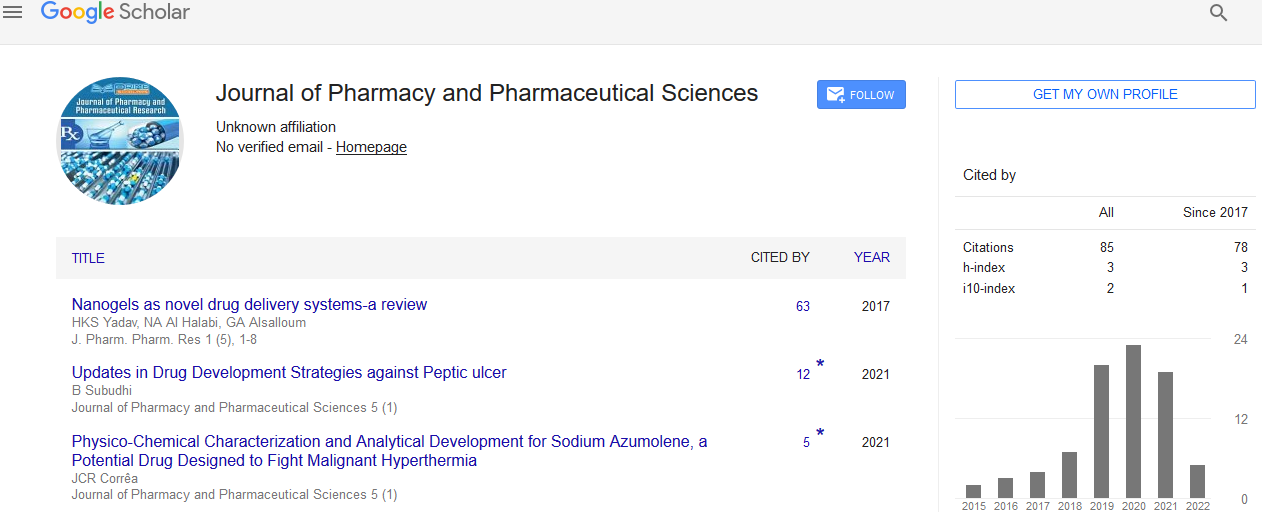Commentary - (2024) Volume 8, Issue 2
Advancements in Pharmacotherapy Research: Unveiling New Horizons in Healthcare
Sophia Sofa*
Department of Pharmaceutical Research, Stanford University, USA
*Correspondence:
Sophia Sofa,
Department of Pharmaceutical Research, Stanford University,
USA,
Email:
Received: 29-May-2024, Manuscript No. IPIPR-24-19959;
Editor assigned: 31-May-2024, Pre QC No. IPIPR-24-19959 (PQ);
Reviewed: 14-Jun-2024, QC No. IPIPR-24-19959;
Revised: 19-Jun-2024, Manuscript No. IPIPR-24-19959 (R);
Published:
26-Jun-2024, DOI: 10.21767/ipipr.8.02.018
Description
Pharmacotherapy, the use of drugs to treat diseases and
alleviate symptoms, stands at the forefront of modern
healthcare. Its evolution has been marked by ground breaking
discoveries, innovative methodologies, and a relentless
pursuit of improving patient outcomes. In recent years,
pharmacotherapy research has experienced significant
strides, driven by advancements in technology, increased
understanding of molecular mechanisms, and a growing
emphasis on personalized medicine. This article delves into
the latest trends and developments in pharmacotherapy
research, exploring how these advancements are shaping
the future of healthcare. One of the most significant shifts in
pharmacotherapy research is the transition towards precision
medicine. Traditionally, medications were developed using a
one-size-fits-all approach, often leading to suboptimal outcomes
and adverse reactions in certain patient populations. However,
with the advent of precision medicine, researchers are now
focusing on tailoring treatments to individual characteristics,
such as genetic makeup, biomarker profiles, and lifestyle
factors. This personalized approach not only enhances efficacy
but also minimizes the risk of adverse effects, heralding a new
era in patient care. In parallel with precision medicine, targeted
therapies have emerged as a cornerstone of pharmacotherapy
research. Unlike conventional treatments that broadly impact
various cellular processes, targeted therapies are designed to
specifically interfere with the aberrant molecular pathways
driving disease progression. From monoclonal antibodies to
small molecule inhibitors, these novel agents offer greater
selectivity and efficacy, particularly in the treatment of cancer,
autoimmune disorders, and rare genetic conditions. By honing
in on precise molecular targets, targeted therapies hold promise
for improved treatment outcomes and reduced toxicity profiles.
Another area of pharmacotherapy research that has garnered
significant attention is immunotherapy. Harnessing the body’s
own immune system to combat disease, immunotherapeutic
agents have revolutionized the treatment landscape across a
spectrum of conditions, including cancer, infectious diseases,
and autoimmune disorders. Checkpoint inhibitors, chimeric
antigen receptor T-cell therapy, and therapeutic vaccines
are just a few examples of immunotherapeutic modalities
that have demonstrated remarkable efficacy and durability
in clinical trials. As researchers continue to unravel the
complexities of immune regulation, the potential applications
of immunotherapy are poised to expand even further. In the
quest for novel therapeutics, drug repurposing has emerged as
a cost-effective and time-efficient strategy in pharmacotherapy
research. By repositioning existing drugs for new indications,
researchers can bypass many of the challenges associated
with traditional drug discovery and development, such as
safety concerns and lengthy approval processes. With the
aid of computational algorithms, high-throughput screening
assays, and data mining techniques, scientists are able
to identify promising candidates for repurposing across a
wide range of diseases. This repurposing approach not only
accelerates the pace of innovation but also maximizes the
therapeutic potential of existing pharmacological agents.
Advancements in biotechnology have fueled the development
of biopharmaceuticals and gene therapy as cutting-edge
modalities in pharmacotherapy research. Biologics, including
monoclonal antibodies, recombinant proteins, and geneedited
cell therapies, offer unparalleled specificity and potency
in targeting disease pathways.
Acknowledgement
None.
Conflict Of Interest
The author declares there is no conflict of interest.
Citation: Sofa S (2024) Advancements in Pharmacotherapy Research: Unveiling New Horizons in Healthcare. J Pharm Pharm. 8:018.
Copyright: & copy; 2024 Sofa S. This is an open-access article distributed under the terms of the Creative Commons Attribution License, which permits unrestricted use, distribution, and reproduction in any medium, provided the original author and source are credited.

